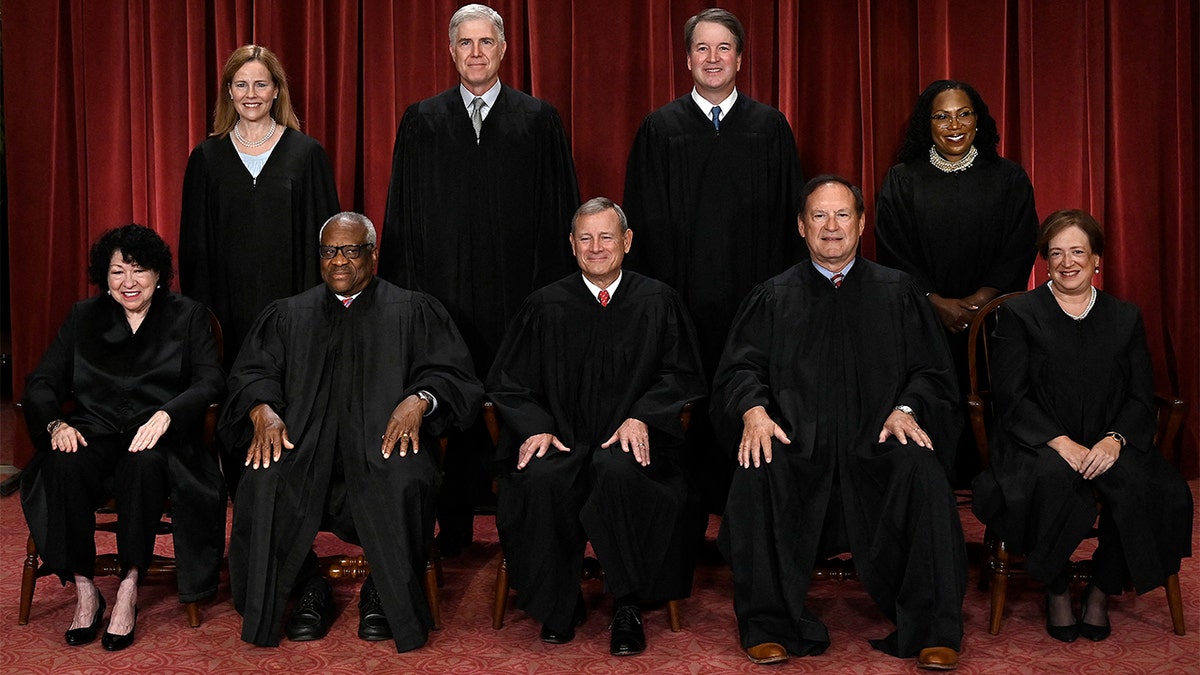Lawyers for Venezuelan men facing deportation told the Supreme Court on Monday that the Trump administration is defying its order by failing to give proper notice, violating their due process rights under the Constitution.
The Supreme Court issued a ruling in a separate case on April 7, allowing the Trump administration to continue its deportations under the 1798 Alien Enemies Act (AEA), proving a significant victory for President Donald Trump’s immigration agenda. The justices noted that the deportations could continue so long as the AEA detainees received proper notice.
“More specifically, in this context, AEA detainees must receive notice after the date of this order that they are subject to removal under the Act,” the opinion reads. “The notice must be afforded within a reasonable time and in such a manner as will allow them to actually seek habeas relief in the proper venue before such removal occurs.”
Due process is a constitutional principle that ensures fairness in legal and administrative proceedings, which includes giving proper notice and an opportunity to be heard in a timely manner by an impartial tribunal. The Supreme Court pointed to Reno v. Flores, a 1993 Supreme Court case, in writing, ‘”It is well established that the Fifth Amendment entitles aliens to due process of law’ in the context of removal proceedings.”
GORSUCH, ROBERTS SIDE WITH LEFT-LEANING SUPREME COURT JUSTICES IN IMMIGRATION RULING

Attorneys representing a group of Venezuelan men fighting deportation and who are currently being held in Texas alleged to the Supreme Court on Monday that the Trump administration was not providing proper notice in contradiction to the high court’s order instructing them to do so. (Getty Images)
“So, the detainees are entitled to notice and opportunity to be heard ‘appropriate to the nature of the case,’” the Court wrote, citing another Supreme Court precedent.
Former Palm Beach County, Florida, state attorney Dave Aronberg told Fox News Digital the high court has purposefully avoided “precise language” when issuing such opinions, leaving the lower courts to concretely delineate what proper due process looks like in these cases.
“Chief Justice [John] Roberts is trying to get unanimity within the Supreme Court,” Aronberg said. “He wants everyone on the same page. And he also wants to avoid a constitutional crisis with the executive branch. So with all these competing interests in mind, he’s trying to be more conciliatory than confrontational with the White House. But that can only go so far.”
Aronberg said that “we may see stronger language going forward from the high court” as the legal challenges proceed.
TWO FEDERAL JUDGES MAY HOLD TRUMP IN CONTEMPT AS HE DEFIES COURTS IN IMMIGRATION CRACKDOWN
In its Monday filing, plaintiff attorneys argued the notice given to the detainees was “inadequate” in light of the high court’s order.
The attorneys wrote that the notice provided was in English, “even though putative class members largely speak only Spanish,” and that it “did not inform” the individuals about how to contest their designation and removal under the AEA, or provide a timeline on how to do so.

The Supreme Court issued a ruling in a separate case on April 7, allowing the Trump administration to continue its deportations under the 1798 Alien Enemies Act. (Olivier Douliery/AFP via Getty Images)
They argued the notice provided “comes nowhere near satisfying the Court’s directive” issued on April 7.
“Whatever due process may require in this context, it does not allow removing a person to a possible life sentence without trial, in a prison known for torture and other abuse, a mere 24 hours after providing an English-only notice form (not provided to any attorney) that gives no information about the person’s right to seek judicial review, much less the process or timeline for doing so,” the filing reads.
“The government cannot plausibly claim that 12 hours is sufficient notice, which could be the reason they tried to keep it from the public and other courts addressing the notice issue, including the U.S. Supreme Court,” ACLU attorney Lee Gelernt, lead counsel in the case, told Fox News Digital in a statement.
Lora Ries, Director of the Border Security and Immigration Center at the Heritage Foundation, told Fox News Digital that she expects these deportation cases to “bounce up and down the court system” as litigants work within the confines the Supreme Court specified in its April 7 opinion.
“For now, the Supreme Court is relying on, if there’s going to be a habeas suit, it’s going to be in the U.S. District Court and then that judge is going to have to rule,” Ries explained. “And I’m sure there will be appeals and some or all of it may end up back at the Supreme Court.”

Lora Ries, Director of the Border Security and Immigration Center at the Heritage Foundation, told Fox News Digital that she expects these deportation cases to “bounce up and down the court system” as litigants work within the confines the Supreme Court specified in its April 7 opinion. (John Moore/Getty Images)
Aronberg noted that due process procedures may vary across the district courts as they juggle the various lawsuits. However, both he and Ries said the issue will likely end up in the high court’s hands once again.
“It is possible that some courts require notice to be in writing and in the native language of the deportee, whereas others could possibly accept less stringent notice requirements,” Aronberg said. “Ultimately, it will lead back to the Supreme Court to dictate what is required.”
CLICK HERE TO GET THE FOX NEWS APP
Ries also said that proceedings will differ in non-AEA cases, saying individuals sought to be removed in those contexts would undergo different types of removals.
“Immigration proceedings are civil proceedings. So you are not innocent until proven guilty,” Reis said. “It doesn’t apply here. You don’t have a right to a public defender. You can have a deportation immigration attorney, but you, the taxpayer, is not paying for it like a public defender.”
Fox News’ Shannon Bream, Bill Mears and Breanne Deppisch contributed to this report.